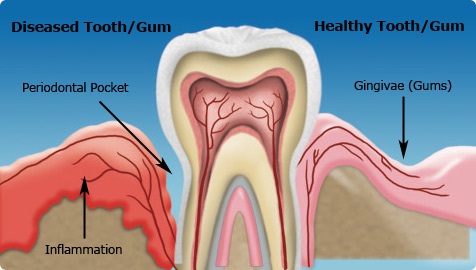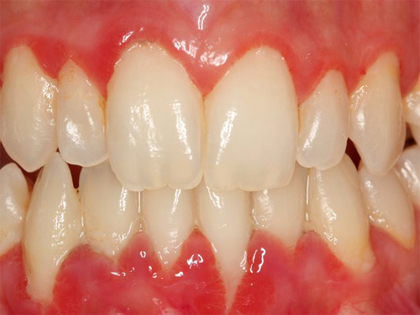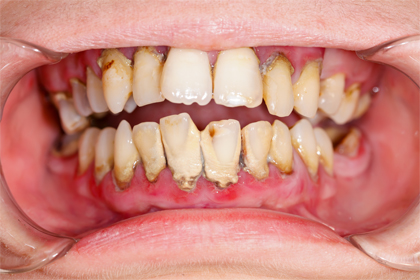Due to poor dental hygiene bacteria and tartar accumulates between the teeth and
gums, affecting the soft tissues that surround and support the teeth, leading to
number of inflammatory conditions called Periodontitis, ultimately causes tooth
loss.

Periodontitis can be prevented by maintaining good dental hygiene. Brushing twice-daily
and flossing daily, along with regular dental checkups, can help prevent periodontitis.
We at Gainesville Dental Arts in Gainesville will help you establish a hygiene and
treatment regimen that will help you to avoid tooth loss and other serious complications
associated with periodontitis.
What is Periodontal (Gum) Disease?
Periodontal disease, or gum disease refers to any condition that affects the gums
and other structures supporting your teeth. It is a painless infection of the tissues
surrounding and supporting the teeth and is the most common cause of tooth loss.
However, bacteria cause the most common forms of periodontal disease. These bacteria
grow in a film called dental plaque that sticks on the tooth surfaces next to the
gums. The bacteria can infect the gums and cause inflammation. The disease can spread
and destroy the gums, ligament and bone around the teeth. Often, patients do not
even know they have periodontal disease. Since it can lead to serious complications
like tooth loss, it is important that the gum disease is diagnosed and treated in
a timely manner. Periodontal disease affects millions of Americans.

Causes of Periodontal Disease
Due to poor dental hygiene bacteria and tartar accumulates between the teeth and
gums, affecting the soft tissues that surround and support the teeth, leading to
number of inflammatory conditions called Periodontitis, ultimately causes tooth
loss.
Signs & Symptoms of Periodontal Disease
Signs and symptoms of periodontal disease include bleeding, swollen or tender gums,
bad breath that doesn’t go away, loose teeth, bad taste in the mouth due to pus
between your teeth and gums, or a change in the way your teeth fit together.
Diagnosis of Periodontal Disease
The good news is that detection of periodontal disease is relatively simple, utilizing
diagnostic procedures which we will perform at Gainesville Dental Arts in Gainesville.
Treatment of Periodontal Disease
We have found the most effective treatment for slight to moderate cases of periodontal
disease is to perform scaling and root planning (deep cleaning above and below the
gum line) in conjunction with a locally administered antibiotic treatment. Our office
utilizes a new antibiotic therapy called Arestin that has been approved by the FDA.
The Arestin therapy is fast, easy and comfortable. Once Arestin is applied, it releases
the antibiotic gradually for up to 21 days.
Periodontal Care and Maintenance
Periodontitis can be prevented by maintaining good dental hygiene. Brushing twice-daily
and flossing daily, along with regular dental checkups, can help prevent periodontitis.
We at Gainesville Dental Arts in Gainesville will help you establish a hygiene and
treatment regimen that will help you to avoid tooth loss and other serious complications
associated with periodontitis.
Types of Periodontal Disease
Periodontal disease can refer to any condition that affects the gums and other structures
supporting your teeth. However, bacteria cause the most common forms of periodontal
disease. These bacteria grow in a film called dental plaque that sticks on the tooth
surfaces next to the gums. The bacteria can infect the gums and cause inflammation.
The disease can spread and destroy the gums, ligament and bone around the teeth.
There are several types of periodontal disease.
Gingivitis
Gingivitis is the mildest form of periodontal disease, caused by bacteria in plaque,
which produce substances that can harm the gums. When you have gingivitis, your
gums are red and swollen. They bleed easily with brushing. Gingivitis doesn't usually
hurt. However, gingivitis can get worse. It can lead to a more serious form of periodontal
disease, called Periodontitis. Gingivitis is quite common. Almost 3 out of 4 adults over age
35 have some evidence of this condition.

Some groups of people are at increased risk:
- People with poorly controlled diabetes
- Pregnant women
- Women taking birth control pills
- People taking steroids
- Teenagers
- People taking certain other drugs, such as cyclosporine (Neoral, Sandimmune,
SangCya), medicine for seizures and blood pressure pills called
calcium channel blockers
Gingivitis can be reversed with a combination of professional and home care.
Chronic Periodontitis
Periodontitis is a more advanced disease than gingivitis. Periodontitis involves
all of the tissues that support the teeth. This includes both the gums and the bone.
Chronic periodontitis is the most common form of periodontitis. Almost 50% of U.S.
adults have some form of it. The older you are, the more likely you are to show
signs of periodontitis.

If you have periodontitis, your gums become detached from your teeth. Spaces called
pockets form between the teeth and gums. Dental plaque builds up in the pockets.
Eventually, this destroys the ligament and bone that support the teeth. In more
severe cases, teeth can become loose and even fall out.
Periodontitis usually is not painful. Some people notice that their gums are bleeding.
The gums may recede (move back away from the teeth). People also may have bad breath
or a bad taste in the mouth. However, periodontitis may not cause any symptoms that
you would notice. Dr. Kaur can diagnose it during an examination; however, the condition
usually gets worse quite slowly, over several years.
Unlike gingivitis, periodontitis can't be completely reversed. That is because the
lost supporting tissues usually can't be rebuilt. However, treatment and proper
brushing and flossing can improve your oral health. This can stop periodontitis
from getting worse. Stopping the disease in this way can help prevent tooth loss
and other serious problems.
Treatment for periodontitis typically includes a thorough cleaning called scaling
and root planing. In certain cases, you may need other steps, such as a antimicrobial
therapy, p periodontal surgery or both.
Aggressive Periodontitis
Aggressive periodontitis gets worse faster than chronic periodontitis and tends
to run in families. It also is more common in smokers, more common in younger people
than in older people. Bacteria found in dental plaque also cause this form of periodontitis.
The treatment generally is the same as treatment for chronic periodontitis. However,
antibiotics and periodontal surgery are needed more often. In certain situations,
aggressive periodontitis can be difficult to treat. These patients do not get better
with treatment.
Periodontitis Caused by Conditions of the Body
Periodontitis can be a symptom of diseases that involve the whole body like leukemia,
neutropenia and genetic disorders. This type of periodontitis can vary, depending
on the medical condition. However, it sometimes looks and acts like aggressive periodontitis.
These patients often are young and do not have large amounts of dental plaque.
Other medical conditions like diabetes and HIV infection can make all forms of periodontitis
worse. People with these conditions usually have a fair amount of dental plaque
and/or calculus (tartar) on their teeth. They are more prone to developing severe
periodontitis.
Treatment involves controlling the medical problem first. This is followed by treatment
similar to that for chronic or aggressive periodontitis.
Necrotizing Periodontal Diseases
Necrotizing periodontal diseases are forms of disease that get worse rapidly. They
cause distinct symptoms, such as:
- Loss of the little triangles of tissue between the teeth
- Significant pain
- Bleeding gums
- A whitish film on the surface of the gums
- Bad breath
- May develop a fever and swollen glands
These conditions occur most often in people whose immune systems have been suppressed.
They are much more likely in people who smoke or have poor nutrition, psychological
stress or HIV infection. For this reason, we will consult with your physician.
The treatment for NUG typically involves:
- Loss of the little triangles of tissue between the teeth
- Scaling and root planing
- Antibiotic pills
- Use of a mouth rinse containing chlorhexidine
- You also may get medicine for fungus infections.
- Education to improve brushing and flossing habits
Periodontal Disease and General Health
Recent studies also suggest possible relationships between periodontal infection
and diabetes, heart disease, pancreatic and oral cancers and increased incidence
of pre-term, low-birth weight babies.